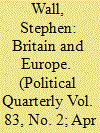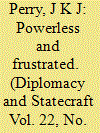| Srl | Item |
| 1 |
ID:
138723


|
|
|
|
|
| Summary/Abstract |
Since its European settlement in 1788, Australia has been dependent on great-power protectors for its security. Initially this security was achieved by virtue of Australia’s status as a British colony, later as a member of the British Commonwealth. In return for its protection, Australia committed military forces in support of British interests to the Sudan, in the Boer War, and in the First and Second World Wars. Australian support for these actions was premised on two key factors: Australia’s membership in the Empire (and with that the identity of its citizens as “independent Australian-Britons”) and the assessment, universal among Australians, that support and protection of the Empire and of British interests were also in their interest
|
|
|
|
|
|
|
|
|
|
|
|
|
|
|
|
| 2 |
ID:
112080


|
|
|
|
|
| Publication |
2012.
|
| Summary/Abstract |
Britain decided to join the European Community because its postwar, postimperial policies had failed and successive Governments saw no viable alternative. After ten years of being denied entry by De Gaulle, Britain joined on disadvantageous terms and with the British political parties, and the British people, deeply divided. Accession did not resolve the underlying issues and Britain's first year of membership saw an unprecedented oil crisis, bad relations between Britain and the United States and the demise of the British government led by Edward Heath. The underlying issues which had not been resolved in the accession negotiations were reopened by Harold Wilson and later by Margaret Thatcher. Some of them remain unresolved in British politics to this day.
|
|
|
|
|
|
|
|
|
|
|
|
|
|
|
|
| 3 |
ID:
107062


|
|
|
|
|
| Publication |
2011.
|
| Summary/Abstract |
Foreign policy is multi-faceted. It was not only diplomatic, political, socio-cultural, economic, Imperial, and strategic factors that structured-and limited-Britain's foreign policy during the interwar period; so, too, did those of other countries. Given the number and variety of Britain's-and the interconnected other Powers'-interests in China, Britain's relationship with China during the opening years of the Second Sino-Japanese War provides a useful insight which has wider implications on Britain's road to war narrative. Given the topic's neglect, one can be forgiven for inferring that events in Europe entirely eclipsed those of East Asia. This article demonstrates the contrary. As awareness of Chinese suffering spread and as Japanese aggrandisement threatened British interests, sinophilism became vogue once again. However, the often insurmountable obstacles that the interwar period presented to Britain and others-particularly the United States-limited Britain's ability to aid China. It was not for want of fortitude.
|
|
|
|
|
|
|
|
|
|
|
|
|
|
|
|